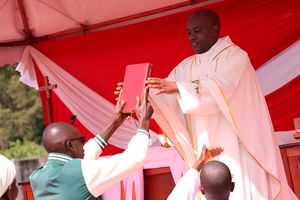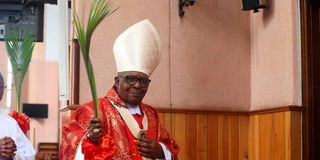
Cardinal John Njue at the Holy Family Basilica, Nairobi, during Palm Sunday on April 5, 2020 .
Kenya’s only surviving Cardinal, John Njue, has said he has not been invited to the Conclave at the Vatican where the next Pope will be elected following the death on Easter Monday of Pope Francis.
Cardinal Njue said Cardinals who participate in the election of the Pope are usually sent an official letter by the Vatican.
On Monday, Cardinal Njue told Nation he had not yet been invited to participate in the Conclave, which begins on Wednesday.
In an interview with Daily Nation, the cleric clarified that he had not been invited, contrary to reports in sections of the media that ill health was the reason for his not joining other cardinals for the election of the Pope.
“Those who go there for the election are usually sent official invites and that has not happened on my part. The fact is that I have not been invited,” the retired Cardinal said in a phone interview.
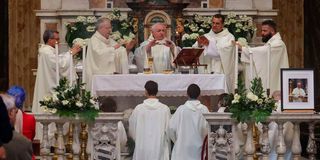
Cardinal Jean Marc Aveline presides over a Sunday Mass in Santa Maria ai Monti church on May 4, 2025, ahead of the Conclave and the election of the new pope, which will start on May 7, in Rome, Italy.
Pressed further to explain whether the reason was due to ill health as has been reported in the media or because he was retired, Cardinal Njue responded: “It is not because of health…I don’t know…really, it’s difficult to comment about it…”
Cardinal Njue participated in the conclave of March 2013, which elected Pope Francis.
In January 2021, the Holy See Press Office announced the then Pope Francis had accepted the resignation of Cardinal Njue from the pastoral governance of the Metropolitan Archdiocese of Nairobi, Kenya.
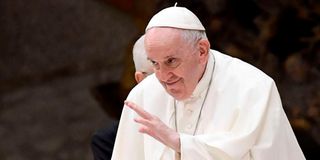
Pope Francis.
He had served as Archbishop of Nairobi from October 6, 2007, to January 4, 2021.
On April 21, 2025 when the Pope died, Cardinal Njue declined to speak about the death of the head of the Catholic Church, saying he was in shock. “I cannot comment at the moment…I am not ready to talk about it now,” he said then.
A report on Vatican News website indicates 133 Cardinals have confirmed participation in the upcoming conclave to elect the next Successor of St. Peter.
“Based on a paragraph in the Apostolic Constitution Universi Dominici Gregis (UDG), the limit of voting cardinals is 120—13 fewer than what the College of Cardinals has announced will be participating next week,” states the report.
It, however, adds it is not the first time the College of Cardinals has exceeded the 120 limit.
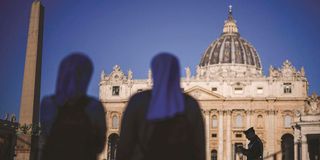
Carabinieri members walks in front of St. Peter's Basilica on April 29, 2025 as nuns stand in St. Peter's Square ahead of the Conclave which will be held on May 7, at the Vatican.
According to the Vatican News, it was on October 1, 1975, that Pope Paul VI first established the rule that the “maximum number of cardinal electors shall not exceed 120” in the Apostolic Constitution, Romano Pontifici Eligendo.
Prior to this, the College of Cardinals reached 134 electors in 1969. The report goes on to observe that despite Pope John Paul II confirming the rule limiting the number to 120, recent Popes have created more Cardinals, exceeding this number.
Cardinal Njue, who was born in Embu in 1946, was ordained a priest by Pope Paul VI on January 6, 1973.
A holder of a doctorate in philosophy from the Pontifical Urbaniana University and a doctorate in theology from the Pontifical Lateran University, in 1974 he was appointed philosophy professor and dean of students at St. Augustine Senior Seminary, Mabanga in Bungoma.
He has been chairman of various commissions such as the Episcopal Commission for major seminaries in Kenya and the Kenya Episcopal Conference’s Justice and Peace Commission.
From 2006 to 2015, he was president of the Kenya Episcopal Conference.
On Wednesday, May 7, 133 cardinals from around the world will gather inside the Sistine Chapel for the sacred and solemn event, the conclave, to elect the 267th successor of St. Peter.
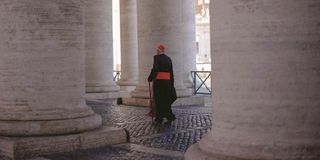
A cardinal walks in St. Peter's Square ahead of the conclave which will be held on May 7, at the Vatican, April 29, 2025.
Following the death of Pope Francis on April 21, church law dictates that the election must begin within 15 to 20 days, hence tomorrow’s start, according to Fr. Dominic Mutuku, OP Director – Institute of Social Communication, Tangaza University.
“A conclave is the process by which the Catholic Church elects a new pope. Guided by detailed legislation and immersed in prayer, it combines transparent rules with strict secrecy behind the sealed doors of the Sistine Chapel,” writes Fr Mutuku in the Nation. “The cardinals, guided by ancient rites as well as modern governance, will draw on centuries‑old law and prayer, weigh the needs of a 1.4 billion‑member Church, and cast secret ballots until one of them secures a two‑thirds majority of the votes, to become the next pope. The process typically unfolds over two to four days, though it can extend if consensus is not reached.”



